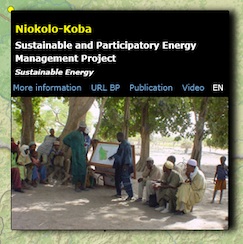Sustainable woodfuel improves rural livelihoods in Niokolo-Koba biosphere reserve – World Heritage site.
 The objective of the Sustainable and Participatory Energy Management Project is to meet an important part of the rapidly growing urban demand for household fuels, without the loss of forest cover and the ecosystem’s carbon sequestration potential and biodiversity.
The objective of the Sustainable and Participatory Energy Management Project is to meet an important part of the rapidly growing urban demand for household fuels, without the loss of forest cover and the ecosystem’s carbon sequestration potential and biodiversity.
More than a decade ago, villagers in rural southeastern Senegal watched helplessly as their native forests were clear cut to feed the cities’ growing hunger for energy-producing charcoal.
As city-based charcoal traders got richer through shipping thousands of tons of inefficiently processed charcoal to Dakar and other urban areas that use the fuel for cooking purposes, the poor in the countryside got poorer, and so did the environment. Tambacounda and Kolda regions lost about 30,000 hectares of forest each year.
And many feared deforestation would encroach on Niokolo-Koba National Park, an international biosphere reserve and UNESCO World Heritage site with 350 bird species and 80 mammal species such as lions, leopards, elephants, antelopes, monkeys, baboons, warthogs, buffaloes, hippopotamus, and crocodiles. Deforestation has slowed and better forest management practices are helping to create a buffer for the national park.
Objectives of the project: (1) implement and monitor environmentally sustainable community-managed forest resource systems, creating a protection zone around the Niokolo-Koba National Park; (2) promote inter-fuel substitution and improved stoves initiatives; (3) strengthen the institutions involved in managing the sector, and promote the participation of the civil society (private sector, academic institutions, and nongovernmental organizations (NGO)) in operating the sector.
The World Bank has funded the following aspects of the project: (1) an assessment of vegetation cover, an assessment of dead wood and other preparatory activities; (2) community-based forest management activities; (3) promotion of rural-based micro-enterprises and private sector and NGO-based inter-fuel substitution activities; (4) consultant services for supervision work, delivery of services, and various technical studies and (5) technical assistance.
Results
Demonstrated that the production and marketing of traditional biomass fuels can be stabilized, while arresting deforestation, contributing to ecological conservation and increasing village incomes. More than 20 percent of Senegal’s woodfuel consumption in 2004 was derived from sustainably managed forests.
Highlights:
- Sustainable community-managed forests were established over an area of 378,161 ha (exceeding project targets), supplying more than 370,000 tons per year of sustainable fuelwood.
- As an incentive for respecting sustainable forest plans, villagers benefited from rural development and training schemes. Community-base micro enterprises were established including beneficiary-operated improved carbonization units, apiculture cooperatives, collective and individual agricultural diversification units/systems; livestock and poultry-raising, arts and crafts units, etc. While woodfuel and large liverstock activities where mostly led by men, all other activities where generally managed and operated directly by women.
- Established a sustainable incremental income generation base (wood and non-wood products) of about US$12.5 million per year, equivalent to a $40,000 average per participating village. Of that total, more than 30 percent resulted from women-led economic activities.
- More than 20 percent of Senegal’s energy supplies were derived effectively from renewable resources in the form of sustainable woodfuels in 2004. (That share has increased to 50 percent today with the introduction of sustainable green wood cutting in an eight-year rotation program).
- Inter-fuel substitutions (switching from charcoal to kerosene and LPG) and improved stoves directly benefited some 250,000 families in the principal urban and peri-urban areas of Senegal, reducing negative health effects associated with in-door pollution.
- Training and micro-credit schemes helped create an economically viable market for improved stoves.
More information:
International Development Association – IDA















